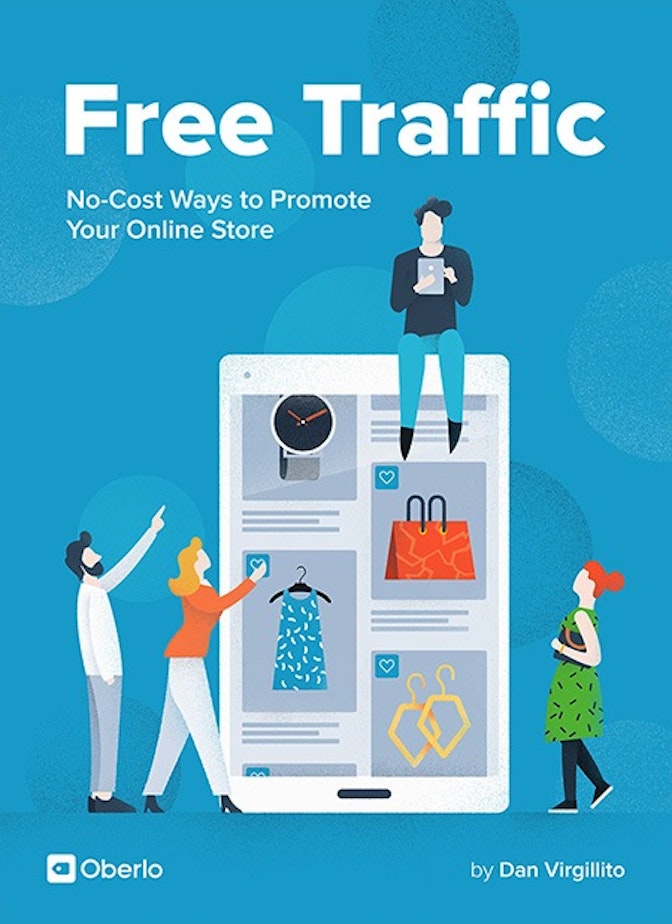You know that old saying: “It’s not what you know, it’s who you know.” And the more recent amendment: “It’s not who you know, it’s who knows you.” Cliché as they might be, it doesn’t mean that they’re not true.
The evolution of the digital world has really transformed the way we can meet people, build partnerships, and grow our businesses. But there’s simply no replacing the value of a grassroots, on-the-ground presence when you have the opportunities. It’s human psychology: being able to interact in-person is a faster way to build trust, figure out whether a relationship is meaningful and useful, and communicate easily and more effectively.
To build a physical network, look into events, meetups, and conferences involving your industry and the people who comprise it. If you have the budget, you might want to consider traveling to attend any of these events, like the annual Shoptalk ecommerce conference in Las Vegas.
While these ecommerce conferences are a world of their own in terms of networking and education, you might be surprised at all of the smaller, more localized opportunities you can find to build relationships that are just as strong.
In this chapter, we’ll discuss in-person network-building strategies like being a vendor for local events, getting involved with meetup groups and similar events, and attending or speaking at industry conferences.



4.1 Be a Vendor for Local Events
Just because you’re running a business that sells products primarily through an online store, it doesn’t mean you should focus all your efforts on online marketing, promotion, and sales. Taking your business into the physical world by becoming a vendor for local events is a strategy that is often overlooked by ecommerce store owners, yet it gives you a number of distinct advantages over ecommerce businesses that stay completely online.
For instance, you get to:
→ Click Here to Launch Your Online Business with Shopify
Market to ideal customers.
If you attend a local event with strong ties to your industry, you’ll have convenient access to a warm, qualified audience of people who are often ready to purchase. For example, if you run an ecommerce store which sells organic health supplements, becoming a vendor at a local farmer’s market will give you a chance to show your products to an entire audience of people who are interested in healthy, organic foods. Just one successful vendor event could drive many new customers to your online store.
Interact with your audience.
Local events give you an opportunity to meet face-to-face with customers. It’s much easier to answer questions about your products and address any potential objections through a friendly conversation rather than by email. You can conduct market research by talking with customers, learning more about what they desire and what drives them to make a purchase. Face-to-face interaction will help overcome any trust issues they might have with buying products online. You’ll be seen as a real person, not some faceless internet business.
Get the word out about your business.
When done correctly, becoming a vendor at a local event can be a cheap and effective way to boost brand awareness. Handing out business cards and flyers, conducting a raffle or giveaway, and giving out free samples can help get your business known in your local area. You’ll also have the opportunity to connect and network with other small business owners in an area, which could lead to lucrative partnerships in the future.
How to Find & Pick Vendor Events
The kind of local event you should join depends mainly on what kind of products you’re selling. In general, you should focus on finding events that are related to your industry. If you’re running an ecommerce store that sells sportswear, you’ll have more chance finding potential customers by becoming a vendor at a local marathon than you will at a local Christmas fair. On the other hand, a local Christmas fair might be a perfect event for an ecommerce store selling toys.
You should also take into consideration the size of the event. If you own a small ecommerce store selling bamboo sunglasses, you might have trouble being accepted as a vendor at New York Fashion Week – but you can always start smaller with a New York street festival.
The final point to consider is the cost of becoming a vendor at a local event. Many events require vendors to pay a fee, which could be anything from $20 for a local school festival to thousands of dollars for a trade event in a major city. You’ll also need to pay for transportation to the event location, wages for staff or helpers, and costs related to setting up your booth and display. If it’s an event where tens of thousands of people regularly attend, the potential ROI might make it worthwhile to invest in a booth. But if you’re unsure about the value of attending the event, it’s a good idea to start with cheaper local events.
Now that you have a better idea of the type of event you should attend, let’s look at some popular ways to find local vendor events.
- Ask Friends and Family
Many people often overlook the simplest way of finding great local vendor events – word of mouth. Ask your friends, your family, your neighbors, your mailman, and anyone else who might know of events in your area. Most people will be more than willing to help, and you might learn about potential opportunities that you hadn’t previously considered. For example, local non-profit organizations such as the YMCA, Rotary Club or Lions Club may let you join vendor events that are usually only advertised to members.
- Use Google
Almost all vendor events will have their own event site or be listed on an industry site. Searching for generic terms such as ‘local vendor events’ or ‘vendor events near me’ will give you too many results, so focus on searching for more specific terms.
Here are some examples:
- ‘[your industry] events [your area / your city / your state / surrounding areas]’
- ‘vendor events [your area / your city / your state / surrounding areas]’
- ‘trade shows [your area / your city / your state / surrounding areas]’
- ‘chamber of commerce events [your area / your city / your state / surrounding areas]’
- ‘local events [your area / your city / your state / surrounding areas]’
- ‘festivals [your area / your city / your state / surrounding areas]’
- ‘craft fairs [your area / your city / your state / surrounding areas]’
- ‘wedding events [your area / your city / your state / surrounding areas]’
- ‘church events [your area / your city / your state / surrounding areas]’
Once you’ve found some search terms that work well for your industry, you can set up Google Alerts to notify you about industry news in your area. You can choose how often you’d like to receive updates, and once the update arrives you can skim through it looking for news about industry events.
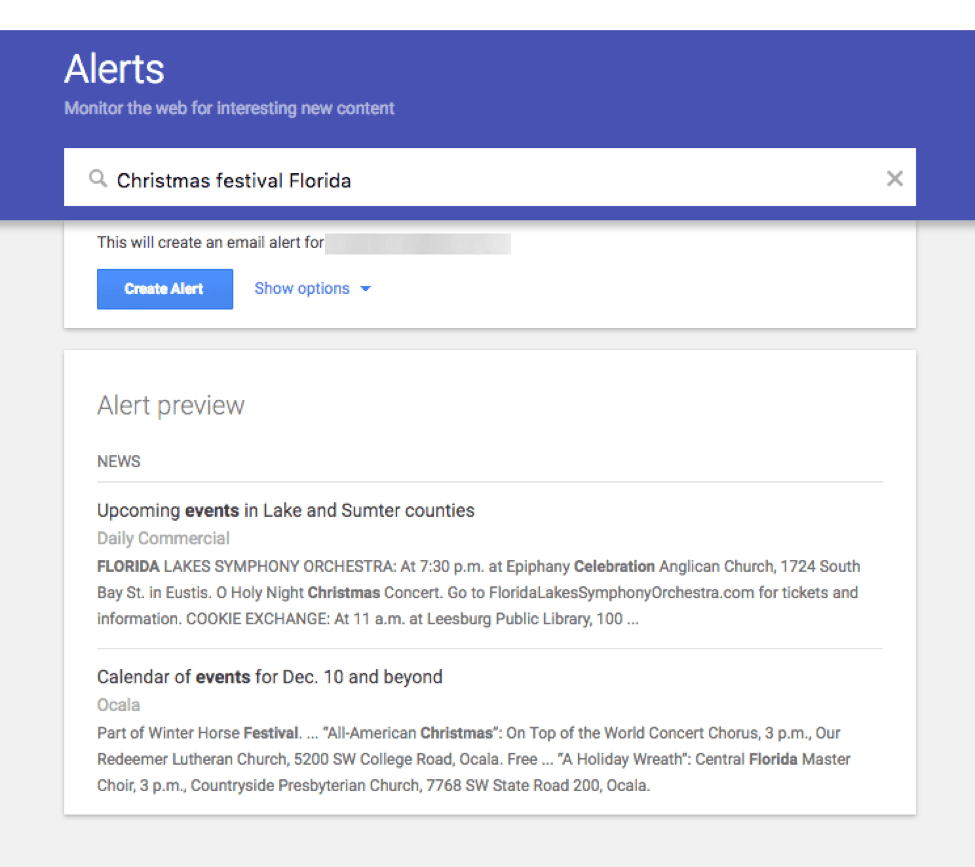
- Contact Your Local Business Association
Your local small business association or Chamber of Commerce is a great source for local vendor events. Not only will they have information about events you might like to attend, they’ll also provide you with contact information for who you need to talk to about joining the event. When you contact a business association, it’s a good idea to ask if they have a newsletter or mailing list you can join so you’ll automatically be informed about future events.
- Join Social Media Groups and Forums
We’ve already talked about joining social media groups and forums for connecting with influencers and potential partners in your industry. These sites can also be great places to learn about local vendor events. On social media sites like Facebook and Twitter, search for accounts belonging to local business associations, the Chamber of Commerce, neighborhood community groups, schools, churches, local media (newspapers, radio, tv stations), and your local tourist board. Some other useful sites are Nextdoor, which is a private social network for your neighborhood that often lists local events, and Craigslist, which has dedicated sites for local communities around the world.
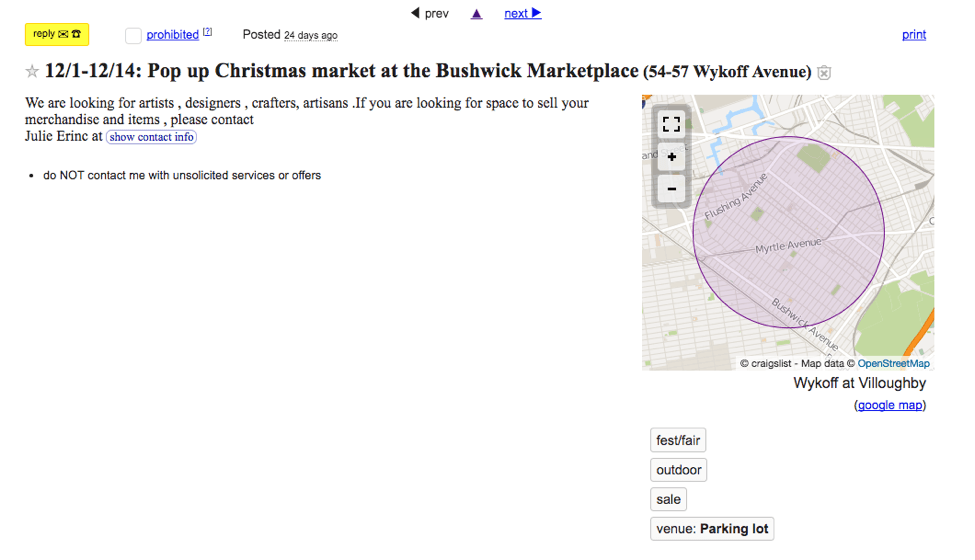
Tips for Making the Event a Success
Many of the most popular vendor events sell out months or even years in advance, so make sure you get started as soon as possible for events you really want to attend. And once you’re in the spotlight, consider taking the following measures:
Ask the right questions. Before contacting the event coordinator, make a list of all the questions you want to ask. How much does it cost? Do I need to leave a deposit? How many people usually attend the event? What kind of people attend the event? How many vendors attend the event? What do I need to supply? Will I have access to power and WiFi?
Attend with a partner. If the event is particularly expensive, consider sharing a vendor booth with another local business or a partner. If the event is already booked out, try contacting confirmed vendors to see if they’d be willing to let you share their space.
Drive visitors to your site. The purpose of becoming a vendor at a local event is to create more awareness of your ecommerce store, so make sure all your promotional material includes your site’s address. You can offer special discounts to event attendees who sign up to your mailing list or even have a giveaway contest (such as one of your products or a gift certificate) which requires people to visit your store to enter.
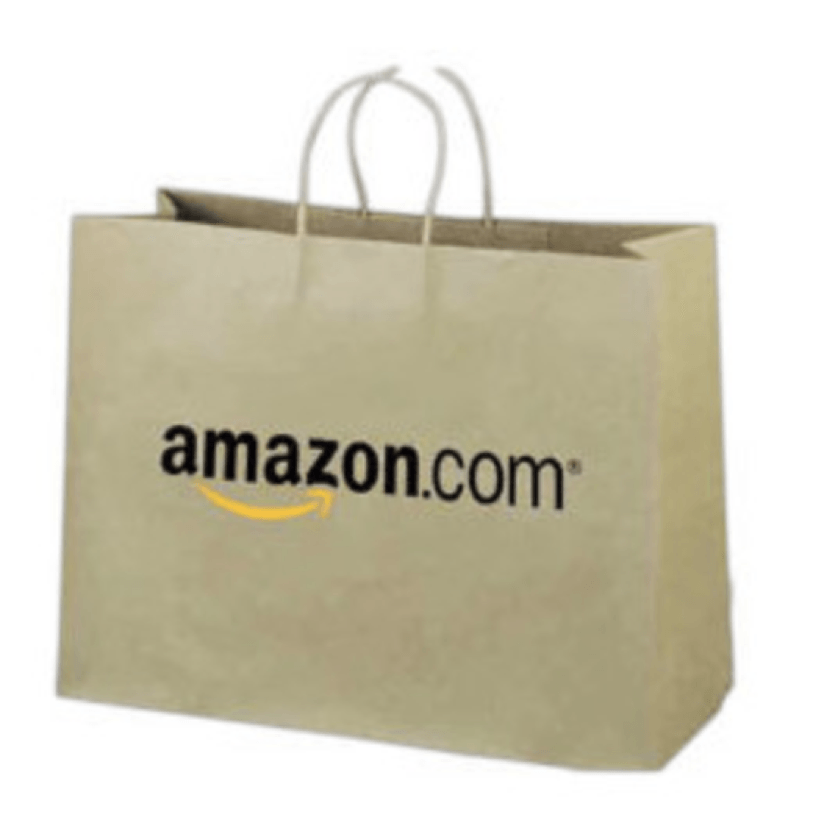
[highlight]Quick Tip: Consider aggregating and connecting all of the contacts you get from these events, like a special Facebook group just for event vendors.[/highlight]
4.2 Get Involved with Relevant Local Meetups and Events
We’ve already looked at a variety of online networking strategies ecommerce businesses can use to connect with like-minded people, such as email outreach and joining social media groups and forums related to your industry. However, it could take months of back-and-forth emails to find, qualify and pitch potential business partners when you’re working completely online.
At meetups, people attend because they’re specifically looking for new contacts to grow their network. In the time it takes to have a cup of coffee or eat a meal, you’ll be able to introduce yourself, ask questions, learn about other businesses, and hopefully build a strong foundation for future endeavors.
Here are some other benefits of getting involved in meetups:
Receive (and give) referrals. In previous sections, we’ve discussed how important referrals are for growing your business. The primary purpose of local business meetups and networking events is the exchange of trusted referrals. The more time you spend contributing to meetings, the more referrals you’ll receive from other members. You might find that referrals from local members could be more cost-effective than any other kind of marketing.
Learn about your industry. Local meetups are the best place to learn about upcoming events, industry changes, and potential opportunities in your community. By speaking with other members, you’ll often learn about opportunities well before non-members, giving you a big advantage over your competitors.
Get advice. Many up and coming ecommerce businesses are run by single owners or a small team. When you get into trouble, it can be hard to find people to talk to. Many people who attend local meetups and business events are experienced entrepreneurs who will be happy to listen to your story, offer you advice, and teach you ways to improve your business.
How to Find Local Meetups and Events
We’ve already looked at ways to find local vendor events, and many of those strategies will also work well for finding business meetups. In addition, here are some more great sources for finding networking opportunities.
- Your Local Chamber of Commerce
This is the best place to start for finding meetups in your local community. Give your local office a call and they’ll happily tell about upcoming networking opportunities that will let you connect with other business owners and influential people in the community. Many chambers also offer business training, professional development, and mentoring opportunities for businesses, and costs for becoming a member are usually reasonable.
- SBA Community Groups
The Small Business Administration is known for giving out small business loans, but they’re also a great resource for business advice, training and learning about local events and networking opportunities. You can find more information about local events by looking at their events page.
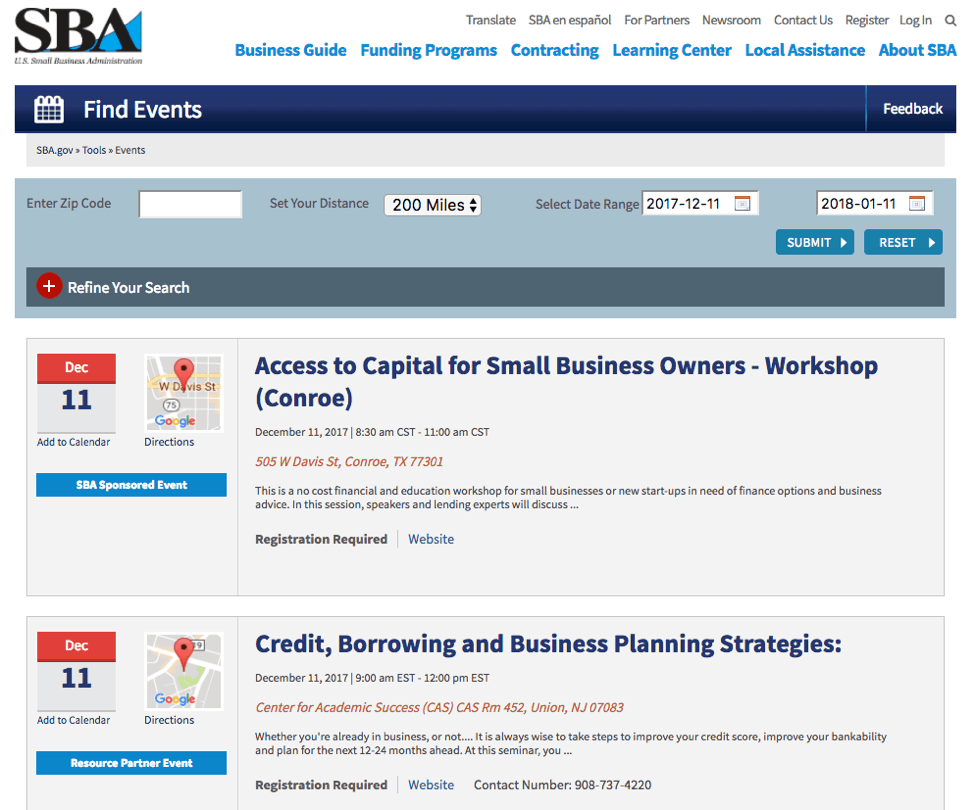
- Business Network International
BNI is a global business referral organization with the purpose of providing opportunities to develop long-term, meaningful relationships between business professionals. With over 8,000 chapters around the world, there’s a good chance you’ll be able to find BNI networking events in your local area.
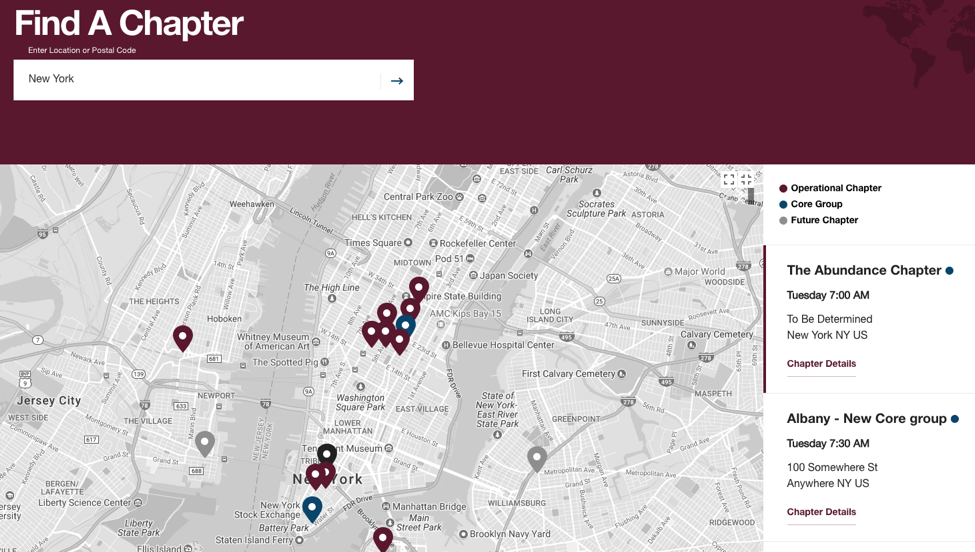
- Eventbrite
Eventbrite is most commonly known as a site for purchasing tickets to local events, but it also has a large database of meetups that are searchable by industry and location. Enter a relevant phrase in the search bar (eg. ‘ecommerce’) and you’ll be shown all the networking events in your local area.
- Co-working Spaces
Overlooked by almost all business owners, co-working spaces are not only places for people without an office to get work done. They’re a fantastic place to network with other similar minded entrepreneurs, learn about opportunities in the area, create partnerships, and build relationships.
- Meetup
Meetup.com is a social networking site that lists meetups for people who want to connect and share ideas. The site allows you to search for meetups in a particular city. In addition, you can find meetups related to a particular niche such as tech and fashion by choosing the relevant industry category. For instance, if you run an online store that sells dog food, you can search for pet-related meetups in your locality.
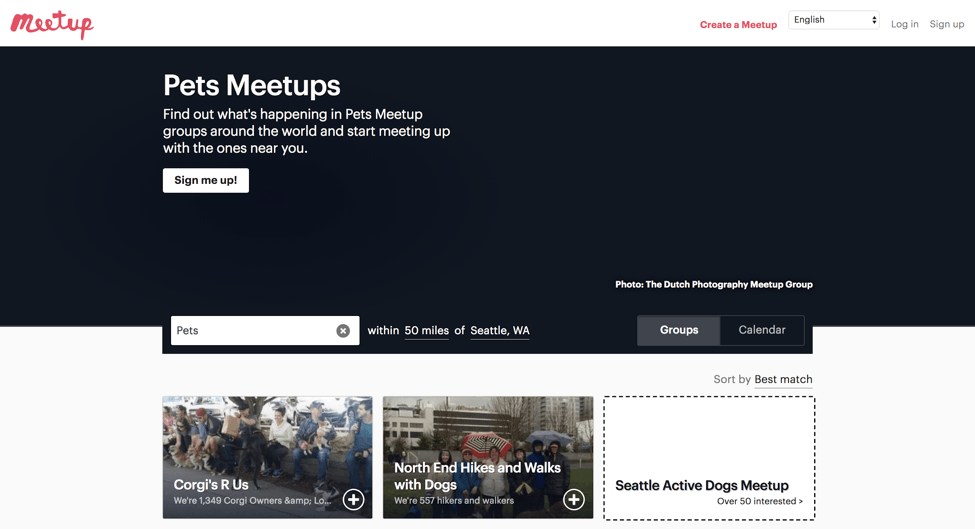
How to Successfully Participate in Local Meetups and Events
Once you’ve identified some meetups that you’d like to join, it’s a good idea to work on your face-to-face networking skills. It’s important to present a good image to other attendees while making the best use of your time. You don’t want to be that person who runs around handing out business cards to everyone in the room, yet nobody can remember your name or business the next day.
Here are some useful strategies to help you succeed at local meetups.
- Be Memorable
If you want to gain some clout with others in your industry, it’s important to be memorable to other business owners. You can do this by creating unique business cards, interesting promotional material, or simply telling a memorable story when you introduce yourself. Above all, be ‘real’ and avoid forcing promotion of yourself or your brand. As I mentioned earlier in the digital networking chapter, people naturally gravitate toward interesting and relatable people. Trying too hard to sell your products or look important will likely be more of a repellant.
- Offer Your Unique Value to the Group
Every member is expected to contribute to local meetups and events, and if you can find a way to offer unique value, you’ll quickly become an integral part of the group. A good place to start is your knowledge of ecommerce. If most other members of the group own brick-and-mortar businesses, it could be a great opportunity to discuss running an online business, using social media, creating content, and conducting online outreach. If they’re interested, of course.
- Focus on Businesses that Complement Your Own
If you’re running an ecommerce store that sells baby clothes, it’s probably best to avoid spending too much time networking with the local fishmonger. They might be a good contact in the future, but initially, you’ll have more success focusing on businesses that are related to your industry. For example, people who work with children (such as the local pediatrician or kindergarten owner) could be a great source of referrals.
- Be Specific When Asking for Referrals
At local meetups, members are expected to give and receive referrals. To get the best referrals, you should try to be as specific as possible. “I’m looking for people who might be interested in buying work boots from my online shoe store” is unlikely elicit much useful information from group members. “I heard that a new factory will be opening in town next month and their new employees will probably need some great work boots. Does anyone have any contacts in the management group of the new factory?” is much more likely to get a response.
- Promote Each Other’s Content
Some group members will be running businesses that are so different from your own that it will be hard to find common ground. This doesn’t mean you can’t be useful to each other. A simple way to help another business is to share and like their posts on social media, write a review on their Yelp page, or become friends on LinkedIn. If they don’t currently use social media, helping them set up a Facebook account could be a great way to get some positive exposure within the group.
- Know When to Persist and When to Move on
It’s important to regularly attend meetups to become known in the area and to build a solid network. Even if you attend every week, it could take months for you to see the rewards. However, if you find that the group is just not effective for delivering business, it’s a good idea to look for another group that will be more beneficial to your business.
[highlight]Quick Tip: Bring a small notepad and take notes as you’re meeting new people. Include a memorable trait about the person to help you remember them, along with any ideas about working with them. This way, you won’t wake up the next morning with a confusing pile of business cards.[/highlight]
4.3 Scope Out Opportunities for Public Speaking
Attending local conferences and meetups is a great way to build brand awareness and meet potential partners. If you get a chance to become a conference speaker, it’s even more beneficial. The good news is that those who organize conferences at a smaller scale are open to featuring up-and-coming businesses.
So if you aren’t ‘big enough’ to be invited for a TED Talk, you can always try for an invite to TEDx.
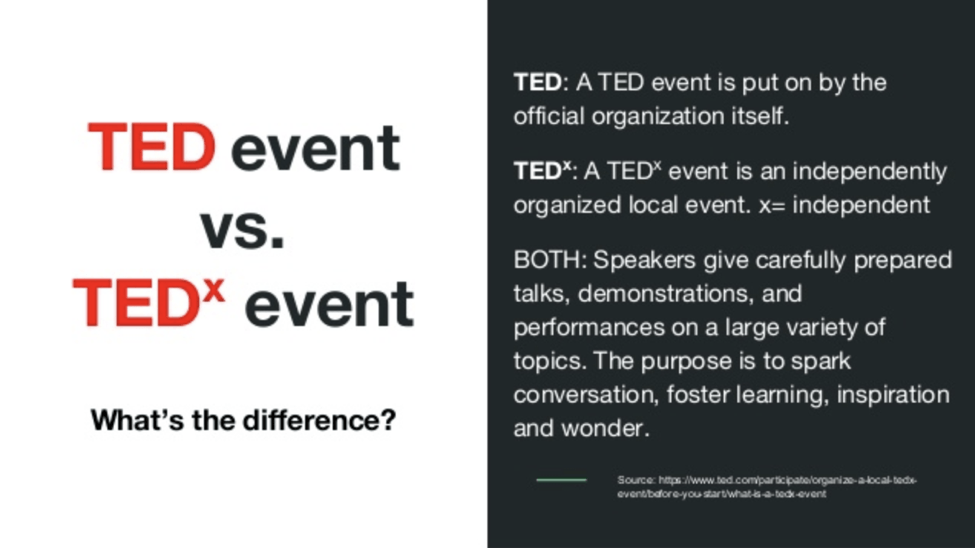
How do I actually find such opportunities?
I’m glad you asked. First of all, inquire about conference speaker opportunities from the professional connections you make at local meetups and conferences. Of course, you’ll have to convey your unique value proposition. Perhaps you have significant experience in the subject. Maybe you have a fancy ecommerce store. Maybe you have attained serious results with what you want to speak on.
Once you’ve leveraged your network, explore the following avenues to add more gigs in your database:
Agent
What if you had a tool that presented you with a list of events in your industry and gave you the contact information for each? Well, that’s exactly what Agent is. The tool offers a list of 1,000+ events, all categorized by date, size, and genre. Additionally, it provides the contact info for the conference or point person, making it easy to reach out to them.
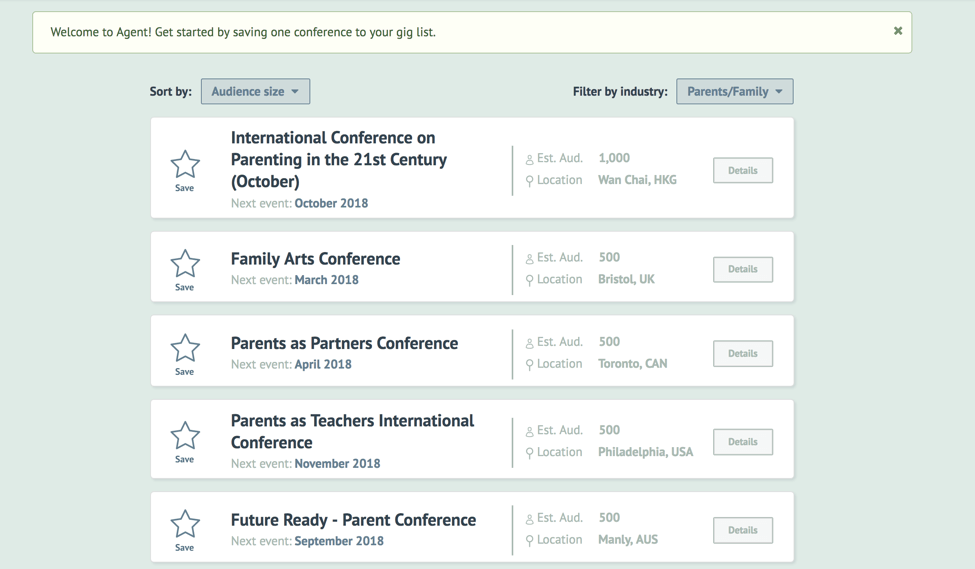
When using Facebook, not only should you keep an eye out for posts and ads that mention a conference, but you should try searching for them. This can be done through the use of hashtags.
Here’s the type of results you’ll find when you search for #conference:
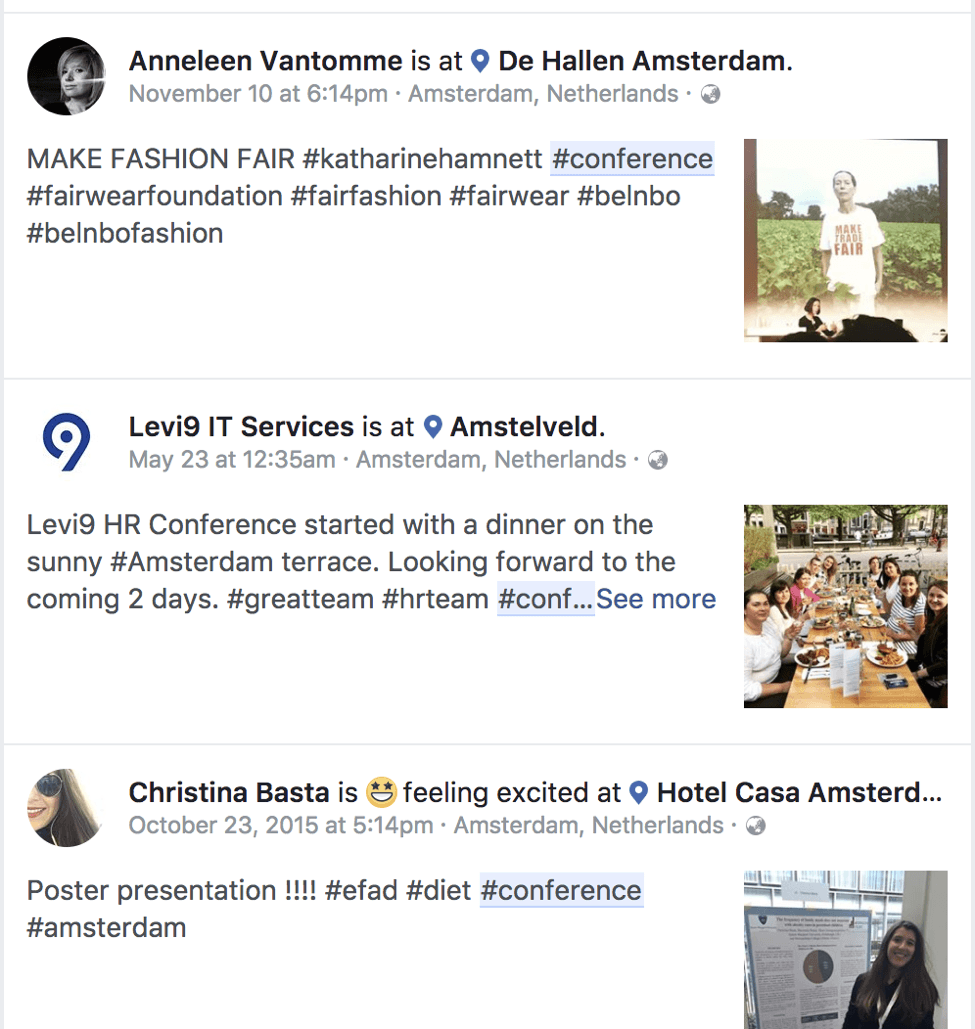

Look at your competitors, colleagues, and other professionals who have the same target audience as you do. Check their LinkedIn profile and websites to see which events they’ve attended as a conference speaker. Then, you can contact the organizers of relevant events and pitch yourself, as well.
If you’ve spoken at a conference in the past and have a recording of it, add that under your summary so organizers can view it immediately after reading your pitch. LinkedIn allows you to include full-length videos. The point is to let them scrutinize a little so they know you’re knowledgeable.

Conference Directories
If you’re looking for more organizers to get in touch with, try conference directories. Conferize, AllConferences.com and Plancast are web-based directories, listing just conferences. Open these websites, create a profile and wait for conference details to be delivered right to your inbox.
It’s rare for Google to let someone down, so use it. As someone who has never done public speaking before – and no, college presentations don’t count – you’ll want to search for realistic conferences and events before you begin shooting for the stars.
Think local, regional and state.
For instance, if you live in Orlando and you’re an online book retailer you could search: ‘Orlando reading conferences’ or ‘Orlando book events’.

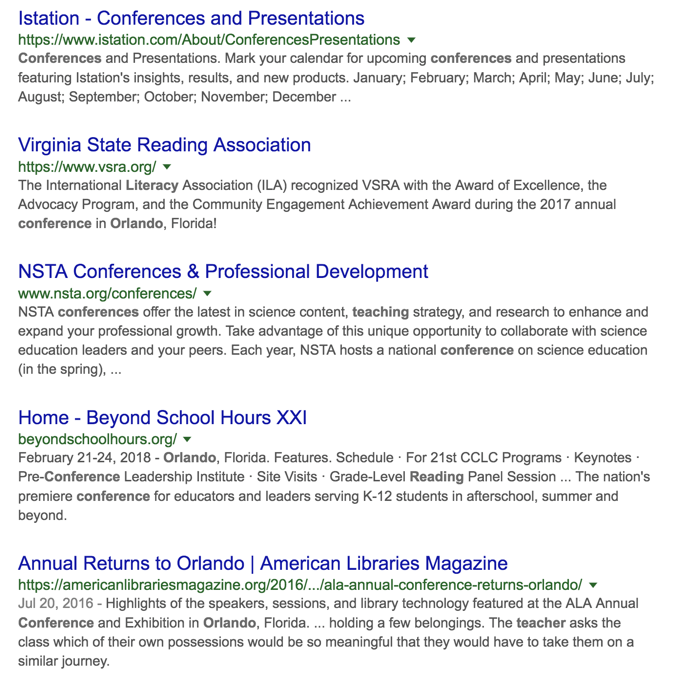
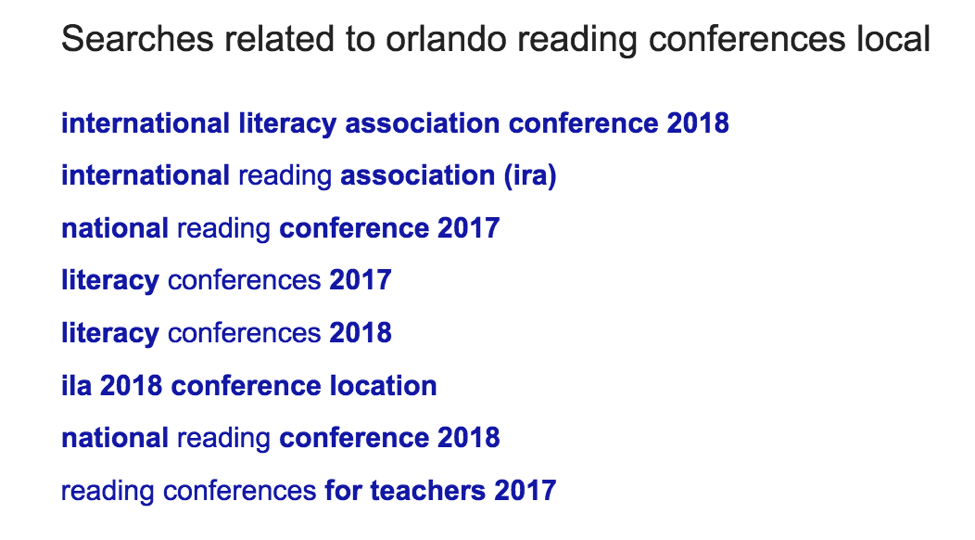
Prepare a List
Start a spreadsheet with dates, links and contact information. Fill in the details and repeat the process until you have 10 feasible events to start with, based on your budget and availability. Taking targeted, focused action is what will get you noticed!
Once you know the details, you can see when organizers are taking speaker applications. Best practice is to start reaching out months in advance in order to generate significant interest in your speaker profile.
Reach out!
Don’t copy and paste the same template to every one of the organizers you intend to contact. That’s the quickest way to get blacklisted and to never hear back from someone. Also, you’re developing a relationship so don’t pitch in the first email.
What to do instead:
- Keep the initial message short.
- Inquire about the conference.
- Ask intelligent questions.
Here’s a script you could use:
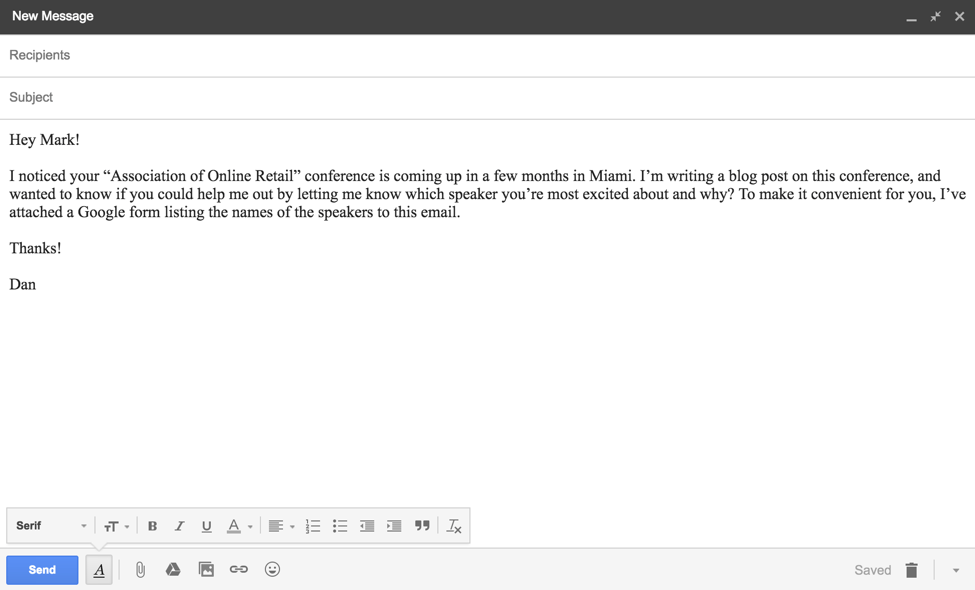
Ultimately, you should attempt to make contact 3-6 months in advance. Some conferences book out shorter – some longer. This is why it’s important to reach out to decision-makers with plenty of notice.
Quick Tip: Keep a section in your spreadsheet to list the responses of these event organizers. Depending on your responses, consider making a new tab or separate spreadsheet for events that require follow-ups or should be shelved until next year.



Chapter 4 Takeaways
Do your research to scope out 50 events, meetups, and conferences where you can vend, network, and speak. I understand that it’s likely physically impossible for you to find time for all of those, which is why the next step is to narrow down the list.
After you’ve sent out your messages and emails and allowed two weeks for responses, trim your list based on costs, your own availability, and whether your application or inquiry was accepted for vending or public speaking engagements.
To find these opportunities, conduct online searches and tap into your existing industry resources. For local events, try contacting your local small business association or Chamber of Commerce. For national and even international events (why not dream big?), you can try consulting conference directories and social media, as well as online tools like Agent.
Similarly to the previous researching techniques we’ve discussed, give yourself several hours to scope the right opportunities, keep your findings organized in a spreadsheet or program, and set yourself a daily schedule until your research is completed.

